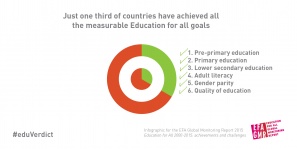
Education for All 2000-2015: Achievements and Challenges
Education for All 2000-2015: Achievements and Challenges
Overview
The 2015 Global Monitoring Report – Education for All 2000-2015: Achievements and Challenges – provides a complete assessment of progress since 2000 towards the target date for reaching the Dakar Framework’s goals.
It takes stock of whether the world achieved the EFA goals and stakeholders upheld their commitments. It explains possible determinants of the pace of progress.
Finally, it identifies key lessons for shaping the post-2015 global education agenda.
Full Report (English)
Special Reports:
Key resources
Key Tweets
- Poorest children are five times more likely not to complete primary school than richest.
- Half of countries have now achieved Universal Primary Enrolment and 10% more are close.
- In 2012, 121m children and adolescents were still out of school, down from 204m in 1999.
- Just one-third of countries have achieved all the measurable Education for All (EFA) goals.
Background Material
Data visualisation tool
Explore goal by goal how far the world has come towards achieving Education for All in our new data visualization tool. See regional and financial breakdowns of progress and delve deeper into country level stats.

Videos
Videos
Interview with Aaron Benavot, Director of the Education for All Global Monitoring Report 2015
Animated launch video: Global Monitoring Report 2015
Video message of support by the United Nations Secretary General Ban Ki-moon






